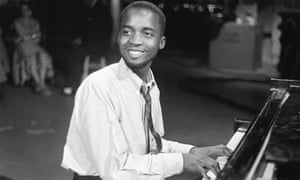- Ahmad Jamal -
Chuck Berry's Johnny B Goode, Ritchie Valens's La Bamba and Peggy Lee's Fever shared the 1958 pop charts with unexpected company: a jazz cover of Poinciana, a romantic song from the 1952 movie Dreamboat. There was no R&B guitar hook or a torch-singer's purr, just piano, bass and drums, but the single stayed on the charts for a record-breaking 108 weeks and it changed the life of Ahmad Jamal.
"I wouldn't be sitting here in London talking to you now if it wasn't for Poinciana," the pianist says now. He wouldn't be in Mayfair's Brown's Hotel either, a discreetly upscale location most jazz musicians might only get to visit by playing in the bar.
At 82, he seems much the same as when I last met him in London in 1996 – just as dapper, just as open to a new thought, as ready to turn the twinkle in his eye into a burst of laughter, or as quick to correct what he sees as a misrepresented detail of his history. A Pittsburgh steelworker's son who first learned piano at three from his uncle, and then devoured the "reams of sheet music" in all genres donated by his aunt Louise, Jamal is the jazz virtuoso briefly turned pop star, who wound up showered with living-legend citations from arts foundations, universities and jazz institutions.
When we met, he is in London to pick up another gong – a lifetime achievement award from Jazz FM, at the station's inaugural Jazz Awards ceremony31 January. An upcoming Barbican concert sold out weeks back, and his latest album, Blue Moon, has collected a raft of critical plaudits and a Grammy nomination.
While it's a typically simmering brew of old showtunes, jazz classics and striking originals, Blue Moon mixes delicacy, jackhammering energy and contemporary rhythmic hipness with a vivacity that an artist half Jamal's age might be stretched to match. Like his early admirer Miles Davis, Jamal develops improvisations as integrated, composition-like pieces full of unexpected turns, rather than headlong torrents of notes. Davis, that most parsimonious of flatterers, declared in his 1989 autobiography that Jamal had "knocked me out with his concept of space, his lightness of touch, his understatement".
Earlier in the 50s, the pianist had run a drummerless trio featuring a guitarist, Ray Crawford, which Davis used to send his rhythm section to check out. Crawford used to tap his fretboard like a drum hit, which Davis drummer Philly Joe Jones copied as a rimshot accent, one of the 50s Davis quintet's signature sounds. "They all did it," Jamal says, with a shrug. "Oscar Peterson had all his guitarists do it too, Herb Ellis, Barney Kessel, all of them."
If Jamal appears to like the sense that he was an unacknowledged hidden hand in the shaping of postwar jazz, it is perhaps an understandable reaction to the rebukes he used to receive from jazz purists for having the temerity to hit the big time commercially. Dave Brubeck, also a 1950s hitmaker, received similar treatment at first – and, like Jamal, Brubeck had the last laugh as an international star respected by insiders and non-specialists alike.
"They asked me to help Dave onstage for our Living Legends awards at the Kennedy Center in 2007," Jamal recalls, chuckling. "'Help Mr Brubeck onstage?' I was feeling as if I needed some assistance myself."
"American classical music," Jamal continues, using the term he coined for jazz years ago, "interpreted the works of composers such as the Gershwins or Irving Berlin beyond their wildest dreams. Take the pianist Art Tatum; most of the body of work he did wasn't his own music, and yet it was totally his. That's a process that has allowed what is called jazz to add so much to the world's culture. Look at the Juilliard School, the New England Conservatory, institutions that wouldn't have thought of teaching Louis Armstrong – now Louis Armstrong is teaching them, they all have jazz departments, and they teach kids from all over the world."
Jamal wryly observes that if he had been thinking about his royalties, he would have included more of his own pieces on his albums back when they sold by the truckload. But he believes the transfer from cover artist to original composer is an organic one, and mirrors the evolution of the art form too.
"The repertoire I learned as a child is vast," he says. "I listened to music from Tatum and Erroll Garner to Mozart. I've composed since I was 10 years old – I used to do 20% my own pieces and 80% other people's; now it's turned the other way. After a certain time you discover the Mozart in you, the Duke Ellington or Billy Strayhorn in you. It takes time to discover yourself. You also have to find and keep players who are in tune with what you're doing; you have that empathy, the quality of breathing together."
View here
View here
Ahmad Jamal's quartet plays The Barbican, London EC2 on 8 February. Blue Moon is out on Jazz Village. Jazz FM will be transmitting performances from its awards show, including Jamal's, in the coming weeks.
FONTE: https://www.theguardian.com/music/2013/feb/01/ahmad-jamal-discover-mozart-in-you
FONTE: https://www.theguardian.com/music/2013/feb/01/ahmad-jamal-discover-mozart-in-you

Nenhum comentário:
Postar um comentário